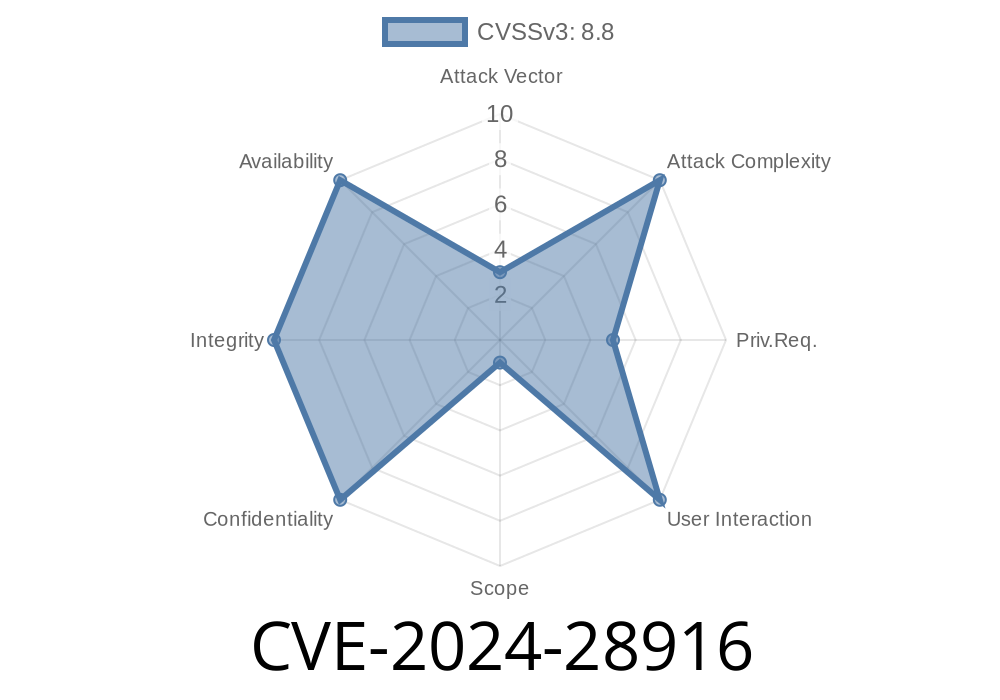When most people hear “Xbox,” they think of video games and fun. But sometimes, the systems behind your favorite games can have serious security flaws. CVE-2024-28916 is a recent vulnerability that affects the Xbox Gaming Services on Windows. In this long read, we’ll break down what this vulnerability is, how an attacker could exploit it, provide code snippets to understand the mechanics, and link you to key resources for more reading.
What is CVE-2024-28916?
*CVE-2024-28916* is an “Elevation of Privilege” vulnerability affecting Xbox Gaming Services on Windows PCs. This means that a regular user (with pretty limited permissions) could abuse this issue to gain SYSTEM level access — the highest privilege on a Windows computer.
The vulnerability was made public by Microsoft in June 2024:
- Microsoft Security Advisory
Xbox Gaming Services is a background service installed with the Xbox app, facilitating things like multiplayer, achievements, and more. By design, it runs with SYSTEM rights.
How Attackers Exploit the Issue: The Anatomy
The bug in Xbox Gaming Services comes down to improper privilege separation. In simpler terms, the service doesn’t properly check who is asking it to do things. As a result, a crafty program could trick the service into running code with SYSTEM permissions.
The exact mechanics rely on abusing the service’s communication channels — often via named pipes or insecurely set file permissions.
Potential Exploitation Path
1. Abuse service methods: An attacker-controlled process interacts with exposed (but unguarded) methods that the Xbox Gaming Service offers.
2. Write arbitrary files as SYSTEM: The attacker can create a file or set a DLL to be loaded by a legitimate process with SYSTEM privileges.
3. Gain a SYSTEM shell: After getting code execution, the attacker can launch a new command prompt or process as SYSTEM.
Code Example: Exploiting a Privileged Service (For Research Purposes Only)
Here’s an adapted PowerShell snippet showcasing how an attacker might execute a command as SYSTEM using a vulnerable service:
# This is a pseudo-example for educational purposes
# Assume we have identified the named pipe \\.\pipe\xboxgservice with weak ACLs
$pipeName = "\\.\pipe\xboxgservice"
$payload = "[execute]cmd.exe /c net user pwned P@sswrd! /add"
# Open the named pipe for writing
$pipe = [System.IO.File]::OpenWrite($pipeName)
$writer = New-Object System.IO.StreamWriter($pipe)
$writer.WriteLine($payload)
$writer.Flush()
$writer.Close()
$pipe.Close()
In the real world, a functioning exploit would depend on the actual flaw — often, it’s about being able to drop a malicious DLL or abusing a file write operation. Some researchers use tools like PSExec to confirm SYSTEM access after exploitation.
Is It Wormable? Who’s at Risk?
It’s not likely to spread from PC to PC by itself, but anyone running Xbox Gaming Services (which can be automatically installed with the Xbox app on Windows 10/11) is at risk. Normal users, especially those sharing computers, are more exposed.
How Microsoft Fixed It
Microsoft fixed the issue by requiring stricter permission checks and locking down the ways regular users can interact with the background service. They've issued patches through Windows Update for all supported versions.
Responsible Disclosure & References
- MSRC – Official CVE-2024-28916
- Microsoft Security Update Guide
- CVE Details Listing
Be cautious about sharing PCs or using accounts without a password.
- Remove unnecessary apps: If you never use Xbox features, consider uninstalling the app and services.
Conclusion
*CVE-2024-28916* underlines why even gaming-related services should be scrutinized for security risks — SYSTEM level bugs are everyone’s problem! Make sure your system is up-to-date, and be wary of new background services introduced by apps. With millions of PCs running Xbox Gaming Services, patching promptly is key.
Want more technical depth? Follow these resources
- Microsoft Security Blog
- Mitre CVE Database
Timeline
Published on: 03/21/2024 00:15:09 UTC
Last modified on: 04/11/2024 20:15:35 UTC
